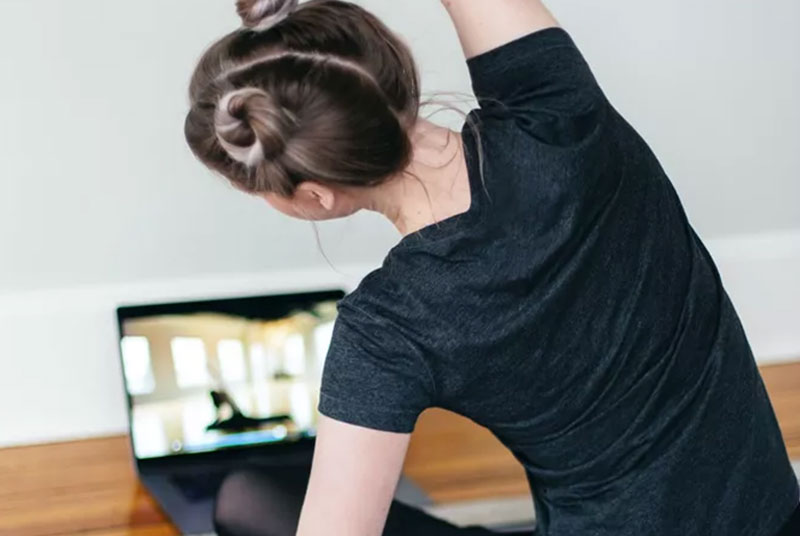Many workers across the UK are working remotely. Some are furloughed, or have been made redundant. Whatever your circumstance, we are all spending more time at home. This means slouching on the couch watching TV, huddled over a laptop, sitting up in bed working from your phone. With less opportunity and incentive to get out and about, and the majority of us exercising significantly less since lockdown, it’s no wonder our physical health is suffering.
Avoiding back pain
There are many steps you can take to minimise back pain while spending more time at home.
Focus on good posture. Keep your spine straight where possible, avoiding slouching or slumping over your desk. If you are working from home, invest in a good chair that supports your lower back and ensure your knees are slightly higher than your hips when you sit down).
You might think it’s a good idea to stay in one place for a long time, as long as your spine is in the correct position. However, your spine is designed to be flexible and keep moving. Sitting or standing in one place for a while can actually put pressure on your spine, so try to move around regularly and take breaks away from the computer where you can.
It’s common sense, but avoid heavy lifting. If you must lift something heavy, make sure you follow safe lifting advice to avoid any injury.
Dealing with back pain
There are several different types of back pain. This ranges from aches and dull throbbing through to severe, sharp pain. Acute back pain tends to last no longer than a few months, but the pain could become chronic if it persists over three months. Chronic pain could be caused by certain conditions, or may have no identifiable cause if the pain continues long after the tissue has healed. This makes chronic pain harder to understand.
Painkillers may help to relieve pain, but they won’t deal with the underlying cause of back pain. Heat or ice packs could also assist in relieving pain, as the cold temperature helps to reduce swelling while heat stimulates blood circulation and improves muscle movement.
Addressing the problem of back pain as soon as possible will help to stop the condition from getting worse. Always seek to alleviate symptoms, not exacerbate them. So be particularly aware of how you’re sitting and sleeping.
You must remember to keep active, even if you are suffering from back pain. You might want to stop in bed or curl up on the sofa, but the best relief for back pain is to keep moving and exercise when you’re able to.
Practice home exercises
A simple stretching routine can help to reduce muscle tension and increase mobility in your spine. Some ideas include:
- Gently bend your head forward until your chin touches your chest. You can also try rolling your neck gently in small circles
- Lift your shoulders as high as you can then slowly roll them back and around
- Bend your head so it feels as though you are trying to touch your ear with your shoulder
- Hold your arms above your head, linking your hands together with palms facing upwards. Reach up until you feel a stretch
- Lie on your back with both knees bent, and slowly bring your knees up one at a time until they touch your chest
- Sit on your chair. Turn your shoulders round until you can grab the top of the chair with your hands. Continue turning until you can feel a stretch
- Hold one arm across your body, pull your elbow in towards your chest gently with your other hand until you can feel a stretch
- Place your hands and knees on the floor. Rock slowly forward, holding the position for five seconds, before rocking backwards again and holding for another five seconds
- Stand up straight and place your hands on your lower back. Lean slightly backwards until you feel a stretch, supporting your weight with your hands
- Lie on your back with your knees bent, with a firm cushion underneath your hips. Relax your body into the cushion support for up to a minute
Improve your lifestyle
Back pain can be exacerbated by a number of lifestyle factors, including weight, diet (lack of calcium and vitamin D in particular), stress and even sleep.
Obviously maintaining a healthy, active lifestyle is bound to help many factors of our life. But keeping back pain at bay while working remotely is a necessity.
Keep an extra close eye on your general physical and mental wellbeing. You may notice you feel more sluggish, less alert and more aware of back pain if you haven’t eaten or slept well. Stress is also known to exacerbate back pain as it can manifest itself physically by causing tightening of the muscles. It can often be a vicious cycle – those worried about back pain become more stressed and anxious, leading to heightened levels of pain. It seems a simple solution to say “think positively” but this is often the case. Find practical solutions to try and ease your back pain, and rather than focusing on the pain try to focus on overcoming it.
Looking to improve your posture?
Our wellbeing experts have developed a series of Wellbeing Insights webinars, including a session on ensuring good posture. If you’d like specific advice for your team, or would like to talk to us about bespoke workshops or training sessions, please get in touch.







